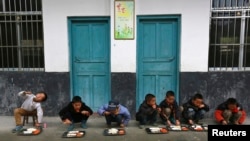China executed a school teacher last week after he was found guilty of sexually abusing 26 children between the ages of four and 11 over a short period of two years. The execution follows the death sentencing of two other teachers in April for similar offenses.
But whether or not the stiff sentences are a sign authorities are getting tougher on offenses against minors is unclear, said Edward Ko-ling Chan, associate professor at the University of Hong Kong and author of a recent book, Child Protection in Chinese Societies: Challenges and Policies.
Chan said that much like other countries, there are laws in China that may or may not be actively used in all criminal cases.
“Public attitude as well as the attitudes of the criminal justice system are playing an important role in law enforcement,” he said, adding, "The current criminal justice response to the case may not represent any change in trend but simply a response to a high profile felony case".
According to state media reports on the case, Supreme People's Court documents said the former primary school teacher, Li Jishun, who was reported to be around 60 years old, carried out the crimes in his school between 2011 and 2012. "He took advantage of those who were both young and timid and committed his acts in dormitories or classrooms," the documents said.
Cases growing
The Supreme People's Court has said that cases of child sexual abuse have been rising in recent years and that courts have handled 7,145 such cases across the country from 2012 to 2014.
One reason for the emergence of more cases is the rising wave of citizen journalism, which often reports cases of abuses of all kinds ahead of government controlled media.
The execution of Li triggered thousands of posts on Chinese social media sites. Many said the death penalty was the best way to deal with such criminals.
One user of Weibo, China’s Twitter, wrote: “Four years old? I can’t believe it. A death sentence is too good for this man.” Another said: “small children need to be taught that no one, not even teachers, has the right to touch their private parts.”
Li’s case and others have exposed a severe lack of oversight by school and educational authorities besides neglect by parents of victimized children, sources said, even more so because some of the teachers have been accused of molesting and raping large numbers of young children.
One incident involving a school principal bringing six young girls to a hotel room led to street protests in 2013 in Hainan province.
Gao Daosheng, a 59-year-old teacher in Wuhu, Anhui province, was sentenced to death last month after the court found him guilty of raping and molesting 11 girls who were studying in the first and second grades at his school. Another death row convict, Yang Shifu, was found guilty of raping two underage girls and sexually abusing an unspecified number of girls between 2012 and 2013.
Weak controls
Edward Ko-ling Chan said such examples paint a pathetic picture of how the issue is being handled in China.
"The country has long been ignoring the issues. The criminal justice system is not ready to enforce law, and the social services, education sector, health services are not providing necessary services to preventing, intervening and taking legal action to abuses," he said. "These factors give room for offenders running away from punishment or disclosure."
Zhongliang Liu, head of Actionaid International in China, said the problem is rooted in society, and more than just judicial action would resolve it.
"It is related with weak control mechanism and lack of the awareness at various levels that include teachers and parents," Liu said. In any case, prevention of such crimes is more effective than the penalty in individual cases, he added.
He called for the building of child protection and monitoring mechanisms in communities and schools. There is also a need for raising awareness of the issue among family members, teachers and school headmasters.
"To implement these activities, the local educational authorities need to take the lead. Child protection experts need to be involved in designing the program," Liu said. He also said there is a need for a system to provide psychological support to victims who are children.









